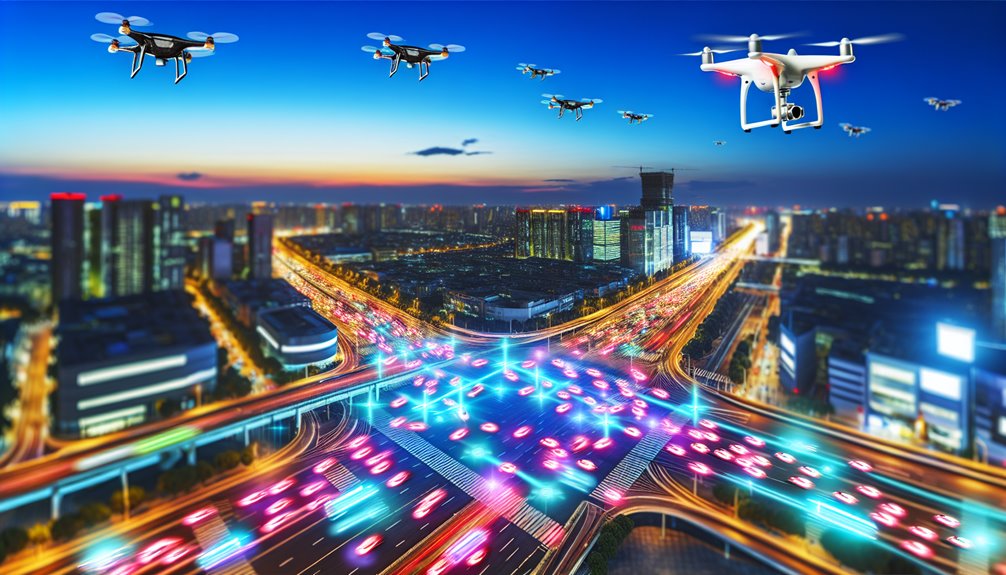The Surge of AI Traffic: A Game Changer for Your Online Strategy
AI traffic has surged nearly 9.7 times in the past year, now representing 0.25% of total site traffic. This remarkable growth indicates a significant shift in user engagement patterns, highlighting the importance of incorporating AI into your online marketing strategies.
According to [Pew Research](https://www.pewresearch.org/) (2022), 62% of internet users have interacted with AI technologies, showcasing the increasing prevalence of AI in everyday online experiences.
While traditional channels like Google still dominate, AI platforms, especially ChatGPT, are gaining ground rapidly. In fact, businesses that leverage AI-driven tools report a conversion rate exceeding 10%, making it vital for marketers to adapt their strategies to enhance site performance.
The integration of AI into marketing not only streamlines processes but also creates personalized experiences that resonate with users. According to [McKinsey](https://www.mckinsey.com/) (2021), companies that utilize AI in their customer engagement strategies see an average increase of 20% in customer satisfaction.
To maintain your competitive edge in this evolving landscape, understanding these trends and user dynamics is essential. The data underscores the necessity of embracing AI technologies to maximize your online potential.
In conclusion, as AI traffic continues to rise, it is imperative to integrate AI engagement strategies into your marketing approach. According to [Deloitte](https://www2.deloitte.com/) (2023), 81% of organizations believe that AI will be a key driver of their business strategy within the next two years, emphasizing the urgency to adapt now.
By staying ahead of the curve, you can leverage the opportunities that AI traffic presents and significantly enhance your site’s performance. There’s more to discover about maximizing this opportunity, so don’t hesitate to explore AI tools and platforms that can elevate your online presence.
Key Takeaways
- AI traffic has surged approximately 9.7 times in the past year, now representing 0.25% of total site traffic.
- ChatGPT generates 80% of AI traffic, outperforming traditional platforms like Reddit and LinkedIn.
- AI channels achieve a conversion rate exceeding 10%, indicating strong user engagement potential.
- Traditional search traffic has declined by 21%, highlighting the growing significance of AI in web traffic strategies.
- Continuous monitoring and strategic resource allocation are essential for capitalizing on AI traffic growth.
AI Traffic Growth Overview
As AI technology rapidly evolves, you might be surprised to learn that AI traffic has surged approximately 9.7 times over the past year, marking a significant shift in online engagement. This dramatic AI growth reflects an emerging trend in traffic analysis, as AI now constitutes 0.25% of total site traffic. Despite a 21% decline in average site search traffic, AI channels boast a conversion rate exceeding 10%. However, this growth may be underestimated due to tracking limitations. Understanding these dynamics is essential for optimizing your digital strategy and leveraging AI traffic to enhance user engagement and conversion rates effectively.
Comparison With Traditional Traffic Sources
While AI traffic is on the rise, it is crucial to recognize how it stacks up against traditional traffic sources.
- Google still dominates, providing 39.35% of referral traffic.
- AI platforms send a mere 0.19% of total traffic, up from 0.12%.
- ChatGPT has overtaken Reddit and LinkedIn combined in traffic generation.
- Traditional traffic shows a slight decline of 1.79 percentage points.
These AI traffic metrics highlight both potential and challenges, especially in referral effectiveness. You’ll need to navigate AI referral challenges while ensuring that your strategy still prioritizes established channels for maximum growth. Additionally, leveraging Google Maps optimization can significantly enhance your visibility and referral traffic.
Insights on AI Platforms
With traditional traffic sources still leading, it’s important to examine the role of AI platforms in the evolving digital landscape. ChatGPT, for instance, accounts for a staggering 80% of AI traffic, highlighting its significant performance. User engagement trends reveal that platforms like Copilot and Perplexity are also gaining traction, albeit at a slower pace. Despite their growth, AI platforms still contribute marginally compared to traditional search. Understanding these dynamics can help you leverage AI traffic effectively, ensuring you’re not just following trends but making informed decisions that enhance your overall strategy in a competitive market.
Implications for Website Owners
Understanding the implications of AI traffic is essential for website owners traversing the shifting digital landscape. You’ll need to adapt your strategies to harness this growth effectively. Consider these key aspects:
Navigating AI traffic is crucial for website owners to effectively adapt and thrive in the evolving digital landscape.
- Implement AI engagement strategies to capture user interest.
- Focus on user experience enhancements to keep visitors engaged.
- Recognize that AI traffic won’t replace traditional search, so balance both.
- Allocate resources strategically to maximize AI benefits.
- Leverage reputation management strategies to build trust and enhance your online presence, ultimately driving more traffic.
Future Trends and Recommendations
As you adapt to the changing dynamics of digital traffic, it is vital to keep an eye on the future trends surrounding AI traffic. AI adoption is likely to grow, but remember, it still represents a small fraction of total traffic. Traffic predictions indicate that while AI will enhance conversion rates, balancing it with traditional search strategies is important. Prioritize ChatGPT in your AI traffic efforts, as it drives significant engagement. Continuously monitor AI trends to refine your approach and leverage data for deeper insights. This strategic focus will help you navigate the evolving landscape effectively. Additionally, custom link opportunities are essential for driving targeted traffic and improving overall SEO success.
Frequently Asked Questions
What Factors Contribute to the Growth of AI Traffic?
Several factors contribute to the growth of AI traffic. First, advanced AI algorithms enhance user experience by delivering personalized content based on user behavior. Data analytics play a vital role, enabling platforms to optimize engagement and conversion rates. As users increasingly seek tailored experiences, AI’s ability to analyze vast datasets effectively drives higher traffic volumes. This synergy between personalization, analytics, and user intent fuels the rapid expansion of AI-driven interactions across various platforms.
How Does AI Traffic Impact User Engagement Metrics?
AI traffic notably impacts user engagement metrics by altering user behavior and engagement trends. As AI becomes a higher converting channel, you’ll notice increased interaction rates and more informed users. This shift means users are more likely to engage meaningfully with your content, leading to better conversion rates. However, it’s essential to balance this with traditional traffic strategies to maintain a thorough understanding of your audience’s behavior and preferences.
Are There Specific Industries Benefiting More From AI Traffic?
Yes, specific industries are indeed benefiting more from AI traffic. In healthcare advancements, AI helps to improve patient engagement through personalized content. Retail optimization leverages AI for targeted promotions, driving sales effectively. Automotive innovation uses AI to enhance user experiences and streamline operations. Meanwhile, financial services tap into AI traffic for tailored advice and insights, increasing customer trust and satisfaction. Focusing on these areas can lead to significant growth and better engagement metrics.
What Tools Can Help Track AI Traffic Effectively?
To track AI traffic effectively, you should utilize advanced traffic analytics and monitoring tools. Platforms like Google Analytics can be integrated with AI-specific metrics, allowing you to assess performance accurately. Additionally, tools like SEMrush or Ahrefs can provide insights into AI traffic sources and conversions. Regularly reviewing these analytics helps you understand trends and optimize your strategies, ensuring you don’t miss opportunities in the evolving landscape of AI-driven traffic.
How Can Businesses Optimize Content for Ai-Driven Traffic?
To optimize content for AI-driven traffic, focus on content personalization and keyword optimization. Tailor your content to address specific user needs and preferences, enhancing engagement. Use relevant keywords strategically to improve visibility in AI searches. Analyze user data to refine your approach continually, ensuring your content resonates with your target audience. By combining these strategies, you’ll not only attract more AI traffic but also boost conversion rates effectively.
Conclusion
As AI traffic continues to surge, it’s essential to integrate this channel into your overall strategy while balancing traditional sources. According to [Deloitte](https://www2.deloitte.com/us/en/insights/industry/technology/technology-media-and-telecommunications-predictions/2023/technology-predictions.html) (2023), 80% of businesses have reported significant improvements in customer engagement through AI-driven initiatives. By understanding the unique strengths of AI, you can enhance engagement and boost conversions.
To effectively incorporate AI into your traffic strategy, it’s crucial to stay informed about emerging trends. A recent study by [McKinsey](https://www.mckinsey.com/capabilities/quantumblack/our-insights/the-state-of-ai-in-2023) (2023) found that companies leveraging AI technologies saw a 25% increase in conversion rates compared to those relying solely on traditional methods. This statistic underscores the importance of adapting your approach to stay ahead in this dynamic landscape.
Embracing AI doesn’t mean abandoning tried-and-true methods; rather, it’s about leveraging both to create a robust, effective traffic strategy for your website. Furthermore, a report from [Pew Research](https://www.pewresearch.org/fact-tank/2023/02/08/ai-use-in-business/) (2023) indicates that 60% of organizations plan to increase their investment in AI tools over the next year, emphasizing the growing reliance on AI as a critical component of successful marketing strategies. By striking the right balance between AI and traditional methods, you can position your business for sustained growth and success in the evolving digital landscape.




